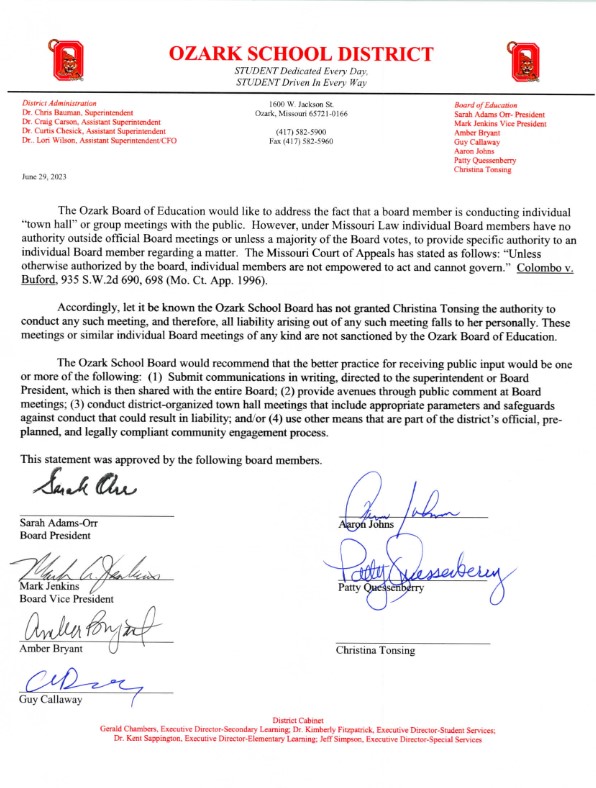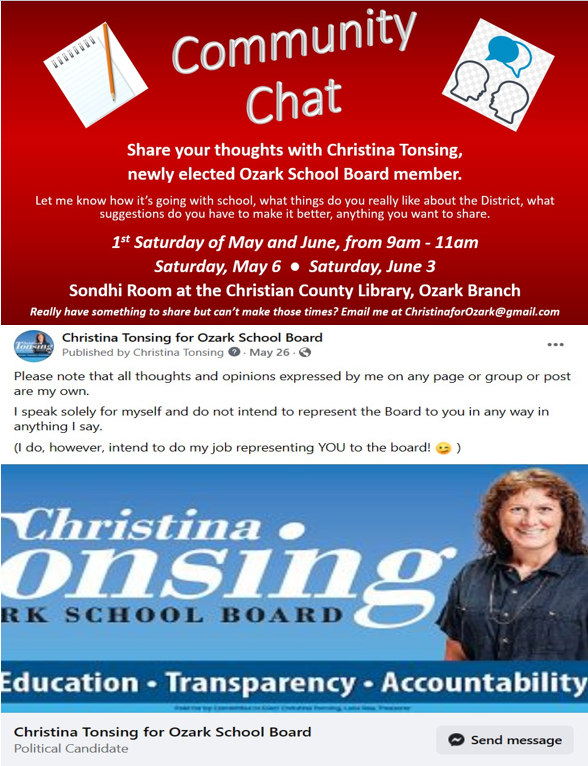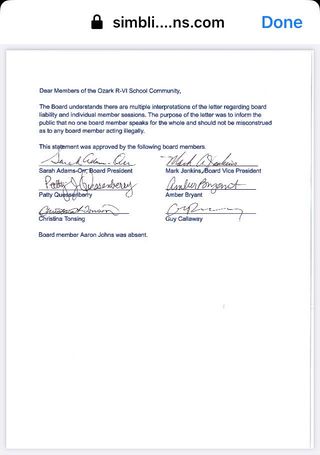Good morning, Ozark! What a beautiful weekend!

Many people have reached out to me to find out what is happening regarding some listening sessions I held at the library two months ago. I am posting here a picture of the letter posted by the school board (found at https://simbli.eboardsolutions.com/Mee…/Attachment.aspx…) along with my explanation. There have been questions about many aspects of the letter, including its intent, how it was initiated and compiled, its meaning, and especially the legality of my holding those sessions as well as what liabilities might be brought to the board. I hope to answer most of those questions here.
I cannot answer for the Board, of course, but only for myself. I was not aware of the letter until about 10 minutes before it was read publicly in the meeting, so I am not able to address any questions about its intent, initiation, compilation, etc. I do note that it reads as if it were authored by someone with legal training, so, however and for whatever reason it was written, it likely came at some expense.
I can, however, confidently answer the question about the legalities and liabilities incurred by a member meeting with the public (their constituents) to hear their ideas. I say “confidently” not because I am sure of myself, but because I’ve consulted attorneys versed in the open meetings act, in education law, and in actions of boards. After the board’s issuance of the letter, I’ve since also been contacted by state legislators and other expert counsel who have further clarified the intent of the Missouri Sunshine Law Open Meetings and Records Act. The liabilities incurred are “none”. Concerns have been raised regarding three main issues: I might speak inappropriately, I might listen inappropriately by hearing something that needed to be reported and failing to report it, or I might be charged inappropriately by someone falsely claiming they had told me something that needed to be reported. The fears then center on the idea that the District or individual board members would be liable in some sort of lawsuit resulting in financial loss. (Even if they were valid, the most minimal awareness of the expensive, lengthy process involved in bringing a suit — let alone a successful one — would likely calm all of those fears immediately.) Regardless, they are not valid.

These issues have been raised since I first published notice of my two intended listening sessions for May and June (pictured at right.) I also published (on social media as well as every single page of my website) an oft-repeated statement that I speak only for me and not for the board (also at right.) Still, concerns remained. Desirous of protecting the District and my fellow Board members, I consulted an attorney, who assured me the concerns were unfounded. However, out of an abundance of caution, we decided to take action to mitigate those concerns. The attorney accompanied me to the listening session in order to advise me (to avoid speaking inappropriately), to ensure every expressed incident was properly reported (to avoid listening inappropriately), and to serve as a witness (to avoid being charged inappropriately.)
Had the members merely followed our Board ethics, established both in Policy BBF (found at https://simbli.eboardsolutions.com/Policy/ViewPolicy.aspx?S=99&revid=LBZplusogXdrBrddW4OtHIe8g==&ptid=amIgTZiB9plushNjl6WXhfiOQ==&secid=zxfvZYmcKkpluslhKHzD4ftFA==&PG=6&IRP=0&isPndg=false) as well as discussed during trainings, and asked me about the listening sessions before writing the letter, they could have collectively learned all of those mitigation measures enacted. As it was, I personally explained before the June listening session to the board President and later to at least one other board member that I felt I needed to follow through with the listening session since I’d already announced it would be held, and I also described the extra steps I was taking to mitigate each concern that had been raised. I expressed to each of them my appreciation for the Board’s openness about their concern for my own sake as well as for the District’s sake, and I emphasized that I valued their input enough to make change to my actions in order to address that input while still keeping my word to the public with the advertised opportunities for listening sessions.
From my perspective, the letter issued by the Board was not a disclaimer but instead a rebuke. It also contained many factual errors and distortions. The letter misnamed the listening sessions “town halls or group meetings”, when in actuality, as you’ll see by reading the attached announcement, I was merely making myself available for anyone who wanted to come by and tell me about their experiences during their school year. I wasn’t speaking nor informing anyone of anything. Our board president righty noted recently that each board member is active in the community and attends many various meetings. If my listening sessions were actually so dangerous as to warrant a needed Board disclaimer, then there is surely equal need for disclaimers to be issued for all of the other board members who also attend meetings and speak with the public. Additionally, as described above, I took action to prevent every liability previously described to me. The letter implies with its last sentence that my listening sessions were somehow not “legally compliant”, but the next few paragraphs show that could not be farther from the truth.
The biggest concern was based on the court case referenced in the letter. There is a problem with that, though. Either someone was very hasty in finding a case to reference, or, worse, there was a total disregard for the importance of context in quoting source material. The letter stated:
“The Missouri Court of Appeals has stated as follows: ‘Unless otherwise authorized by the board, individual members are not empowered to act and cannot govern.’ Colombo v. Buford, 935 S.W.2d 690, 698 (Mo. Ct. App. 1996) Accordingly, let it be known the Ozark School Board has not granted Christina Tonsing the authority to conduct any such meeting, and therefore, all liability arising out of any such meeting falls to her personally. These meetings or similar individual Board meetings of any kind are not sanctioned by the Ozark Board of Education.”
The quoted sentence, which IS indeed found written in the opinion on the case (show below, from the 7th paragraph under “Discussion”, part C, found at https://law.justia.com/…/court-of…/1996/wd51723-2.html), does NOT AT ALL reference one board member holding listening sessions or anything else like that. It instead is used to support the next sentence’s conclusion (note the use of the word “thus”) that groups of less than a quorum do NOT violate the Sunshine Law, so they CAN talk together with each other (and, as the entirety of that point in the court case addresses, with the public) without worry of violation. Ironically enough, the very quote used to attempt to quell individual “meetings” with the public, was instead intended by the Appeals Court to support them:
“This court previously addressed the issue of what constituted a ‘public governmental body’ in Tribune Pub. Co. v. Curators of Univ. of Mo., 661 S.W.2d 575, 584 (Mo.App.1983). There we recognized the power to govern as being a factor in determining what constitutes a ‘public governmental body’, stating that “the quintessence of a ‘public governmental body’ is the power to govern…. It defies semantics to believe that the legislature intended inclusion of bodies or entities barren of the power to govern in the definition of `public governmental body’.” Id. Unless otherwise authorized by the Board, individual members are not empowered to act and cannot govern. Thus, because members of a body cannot act individually. Groups of less than a quorum of the board would not logically fall within the definition of a ‘public governmental body’ subject to the Sunshine Law.”
Earlier in the same decision (again, the entire ruling is shared at https://law.justia.com/…/court-of…/1996/wd51723-2.html), the court validated not just one, or a few, but ALL of the board members getting together for social purposes, “without regard to whether public business was actually discussed.” This court finding rules that all the board members could have been at a social gathering AND spontaneously discussed school business — without violating the law. The only thing that mattered in the eyes of the law was the intent of the meeting:
“…this activity was not a “public meeting” subject to the Sunshine Law because it was an informal gathering for social purposes only. Section 610.010(5) defines “public meeting” and specifically excludes informal gatherings for social purposes from its definition when there is no intent to avoid the purposes of the Sunshine Law. As this court found in Kansas City Star Co. v. Fulson, the “[l]egislature provides an absolute exclusion for informal social gatherings where there is no intent to circumvent the purposes of Chapter 610,…” without regard for whether public business was actually discussed. Kansas City Star Co., 859 S.W.2d at 939-40 (Mo.App. 1993).”
The appellate court also noted the “sound reasoning” in another state’s case which explained how those individual conversations between board members are not only allowed but even necessary:
“While it is true that decisions from other states ordinarily are of very little assistance in construing Missouri’s Sunshine Law, we believe Hispanic Education Committee, cited by respondents is instructive and in keeping with the public policy of this state that ‘meetings, records, votes, actions, and deliberations of public governmental bodies be open to the public….’ § 610.011.1. In Hispanic Education Committee the court was called upon to decide whether board members, in numbers less than a quorum, discussing the hiring of a board member as superintendent, violated the Texas Open Meetings Law. The court in holding that it did not, observed that ‘[l]imiting board members’ ability to discuss school district issues with one another outside of formal meetings would seriously impede the board’s ability to function.’ Hispanic Education Comm., 886 F. Supp. at 610. In so holding, the court, in part, was relying on the fact that without a quorum there could be no action taken and without action THERE COULD BE NO ILLEGALITY. In addition, the court noted that there was no evidence of any systematic attempt to circumvent or avoid the purposes of the state’s open meetings law. The clear implication from this is that if there had been, the court would have found a violation of the Open Meetings Law regardless of whether the quorum requirement was met. This is sound reasoning and balances the logic of adopting the ‘quorum requirement’ against the need to prevent circumvention of the Sunshine Law by conducting public meetings “in a piecemeal fashion without a quorum being present.” [emphases mine]
A well-known saying which I’ve referenced before is again verified here: fear is a terrible taskmaster. The fear instilled among school board members about meeting or talking or discussing school business, as the Appellate Court noted, “seriously impedes the Board’s ability to function.”
We can hope it will now be shaken off by the light of truth.

UPDATE: Due almost entirely to the enormous outpouring of outrage from individuals, community groups, and a publication over the idea that the Board would censure a member for listening to the community, the Board issued a clarification letter at the August meeting. In it, assurances were made that no laws had been broken by the listening sessions. Thank you to you all for standing up for the vital element that enables your accurate representation, a chance to hear from you at a Community Chat listening session.
**Please note that all thoughts and opinions expressed by me are my own. I speak solely for myself and do not intend to represent the Board to you in any way in anything I say. I do, however, fully intend to do my job representing YOU to the board! 😉